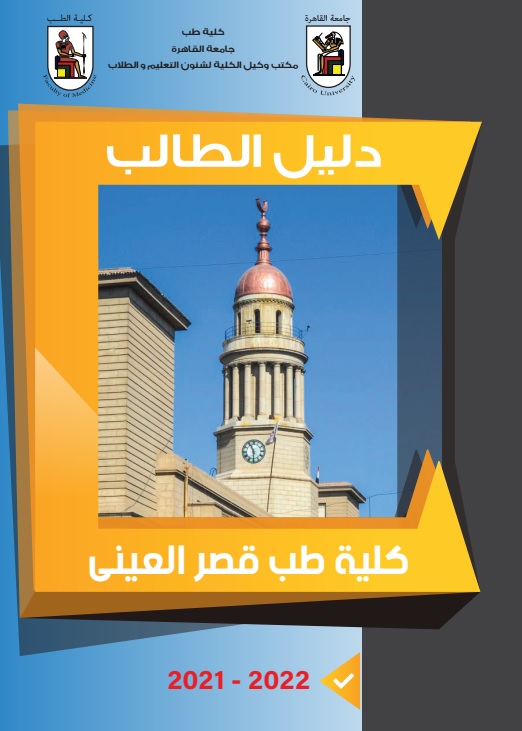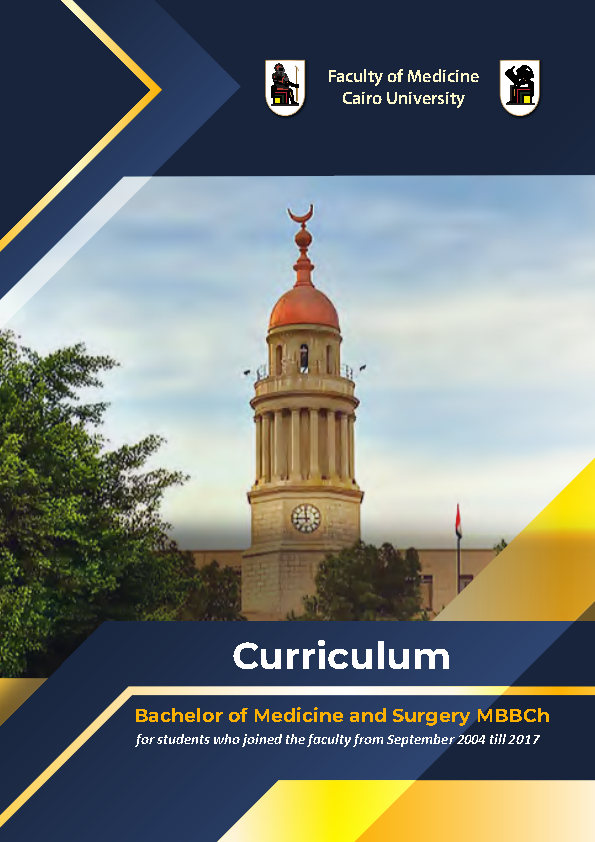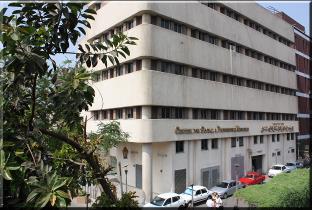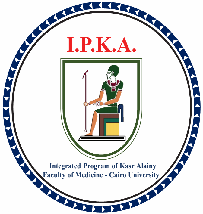Undergraduates Internal Regulations (en)
- Details
- Parent Category: Undergraduate Program
- Category: Regulations and Bylaws
Article Index
Chapter One
The Faculty Departments
Item 1:
The Faculty of Medicine, Cairo University, consists of the following departments:
1. Human Anatomy and Embryology.
2. Histology.
3. Human physiology.
4. Medical biochemistry.
5. Pathology.
6.Clinical pharmacology
7. Microbiology and medical immunity.
8. Medical parasitology.
9. Ophthalmology.
10. Ear, nose and throat
11. Forensic medicine and clinical toxicology.
12. Community medicine.
13. Internal medicine.
14. Pediatrics.
15. Dematology.
16. Reumatology, rehablitation and physiotherapy.
17. Cardiology.
18. Clinical and chemical pathology.
19. Psychiatry.
20. Neurology.
21. Tropical Medicine.
22. Chest.
23. General surgery.
24. Gynecology and obstetrics.
25. Orthopedic surgery.
26. Urosurgery.
27. Neurosurgery.
28. Cardiothoracic surgery.
29. Anaesthesia and surgical intensive care.
30. Diagnostic radiology.
31. Medical oncology and nuclear medicine.
32. Andrology.
33. Family medicine.
34. Intensive care.
35. The occupational and industrial medicine.
Chapter Two
Item 2:
The Cairo University grants Bachelor of Science in Medicine & Surgery at the request of the Faculty of Medicine.
Item 3:
The program duration to obtain B.Sc. of Medicine and Surgery is six years.
Item 4:
The courses studied to obtain B.Sc. of Medicine and Surgery is:
Firstly: The education passes through 2 stages:
The First Stage: The pre clinical medical sciences (first, second & third academic years)
The Second Stage: Clinical Medical Science(fourth, fifth, sixth years)
Secondly: The distribution of subjects according to the years of study:
The First Year:
Human Anatomy and Embryology (part 1).
Histology (part 1).
Human physiology (part 1).
Medical biochemistry (part 1).
English Language (part 1).
Computer sciences.
The Second Year:
Human Anatomy and Embryology (part 2).
Histology (part 2).
Human physiology (part 2).
Medical biochemistry (part 2).
Humanities & Behavioral sciences.
The Third Year:
Pathology.
Clinical pharmacology
Microbiology and medical immunity.
Medical Parasitology.
The Fourth Year:
Ophthalmology.
Ear, nose and throat
Forensic medicine and clinical toxicology.
Community medicine.
The Fifth Year:
Gynecology and obstetrics.
Pediatrics.
Internal medicine.
General surgery.
The Sixth Year:
Internal medicine and its branches.
General surgery and its branches.
Item 5:
The curriculum of Genetics is studied in the relevant departments during the course of study.
Item 6:
The total marks of B.Sc. Stage are distributed as follows:The total marks
Stage First Second Third Total
Pre-clinical 800 850 950 2600
Clinical 950 1120 1680 3750
Total _ _ _ 6350
Item7:
The studied curricula in the first year, their allocated hours for study, the methods of student examination and the maximum marks for each are demonstrated in the following table:
|
The curriculum |
Teaching hours |
examination |
Maximum allocated marks |
||
|
Lectures (hours) |
Practical (hours) |
||||
|
Anatomy and embryology including biology |
120 |
120 |
3 hours written exam. Oral exam. Practical exam. |
250 |
|
|
Histology |
60 |
60 |
3 hours written exam. Oral exam. Practical exam. |
150 |
|
|
Physiology |
150 |
60 |
3 hours written exam. Oral exam. Practical exam. |
250 |
|
|
Biochemistry |
75 |
60 |
3 hours written exam. Oral exam. Practical exam. |
150 |
|
|
English |
30 |
- |
1 hour written exam. |
Pass or fail |
|
|
Computer sciences |
30 |
30 |
1hours written exam. |
Pass or fail |
|
Item8:
The studied curricula in the second year, their allocated hours for study, the methods of student examination and the maximum marks for each are demonstrated in the following table:
|
The curriculum |
Teaching hours |
examination |
Maximum allocated marks |
||
|
Lectures (hours) |
Practical (hours) |
||||
|
Anatomy and embryology including biology |
120 |
120 |
3 hours written exam. Oral exam. Practical exam. |
250 |
|
|
Histology |
60 |
60 |
3 hours written exam. Oral exam. Practical exam. |
150 |
|
|
Physiology |
150 |
60 |
3 hours written exam. Oral exam. Practical exam. |
250 |
|
|
Biochemistry |
75 |
60 |
3 hours written exam. Oral exam. Practical exam. |
150 |
|
|
Humanities & Behavioral Sciences |
30 |
- |
1 hour written exam. |
50 |
|
Item9:
The studied curricula in the third year, their allocated hours for study, the methods of student examination and the maximum marks for each are demonstrated in the following table:
|
The curriculum |
Teaching hours |
examination |
Maximum allocated marks |
||
|
Lectures (hours) |
Practical (hours) |
||||
|
Pathology |
120 |
120 |
2 hours written exam. Oral exam. Practical exam. |
300 |
|
|
Pharmacology |
120 |
60 |
2 hours written exam. Oral exam. Practical exam. |
300 |
|
|
Microbiology and immunology |
90 |
60 |
2.5 hours written exam. Oral exam. Practical exam. |
200 |
|
|
Parasitology |
60 |
60 |
2.5 hours written exam. Oral exam. Practical exam. |
150 |
|
Item10:
The studied curricula in the forth year, their allocated hours for study, the methods of student examination and the maximum marks for each are demonstrated in the following table:
|
The curriculum |
Teaching hours |
Examination |
Maximum allocated marks |
||
|
Lectures (hours) |
Clinical (weeks) |
||||
|
ophthalmology |
80 |
8 |
2hours written exam. Oral exam. Practical exam. |
250 |
|
|
Ear, nose and throat |
64 |
4 |
2 hours written exam. Oral exam. Practical exam. |
200 |
|
|
Forensic medicine and toxicology |
80 |
64 hours practical+2 weeks clinical |
3 hours written exam. Oral exam. Practical exam. |
200 |
|
|
Community medicine |
128 |
64 hours practical+2 weeks field visits |
3 hours written exam. Oral exam. Practical exam and field reports. |
300 |
|
Item11:
The studied curricula in the fifth year, their allocated hours for study, the methods of student examination and the maximum marks for each are demonstrated in the following table:
|
The curriculum |
Teaching weeks (44 weeks) |
examination |
Maximum allocated marks |
||
|
Lectures |
clinical |
||||
|
pediatrics |
108 hours |
14 weeks |
2 written exams. Ø The first 3 hours Ø The second 2 hours Oral exam. Clinical exam. |
500 |
|
|
Obstetrics and gynecology |
108 hours |
14 weeks |
2 written exams. Ø The first 3 hours Ø The second 2 hours Oral exam. Practical exam. |
500 |
|
|
Internal medicine |
20 hours |
8 weeks |
Written exam (formative assessment). clinical exam. |
60 |
|
|
General surgery |
20 hours |
8 hours |
written exam (formative assessment). clinical exam. |
60 |
|
Item12:
The studied curricula in the sixth year, their allocated hours for study, the methods of student examination and the maximum marks for each are demonstrated in the following table:
|
The curriculum |
Teaching weeks (36 weeks) |
examination |
Maximum allocated marks |
||
|
Lectures |
clinical |
||||
|
Internal medicine and its branches |
196 hours |
20 weeks |
3 written exams each of 3 hours duration. Oral exam. clinical exam. |
840 |
|
|
General surgery and its branches |
196 hours |
20 weeks |
3 written exams each is of 3 hours duration. Oral exam. clinical exam. |
840 |
|
Item 13:
The head of the department is entrusted with putting down the written exams guided with the questions handed over by the professors who had already taught the course. He should take into account that the exam must be comprehensive. The exam should include a blend of the different types of written questions to measure the objectives stated in the curriculum. One professor or more should participate in putting down the exam, yet the head of the department must guarantee the exam secrecy. Also the head of the department has the right to send for professors from other national or international faculties for the oral and clinical exams if necessary.
Item 14:
Regulations of study and examination of The Pre-Clinical Stage:
The course of study in this stage is 30 weeks. The exam is held in 2 turns:
The first turn: In May.
The second turn: In September.
The University Council can modify the exam schedule and subsequently the number of study weeks at the recommendation of the Faculty council.
20% of the total marks are assigned for the attendance and formative exams (written, oral or practical exams) during the study period and according to the system recommended by the faculty council except for the English language, computer sciences and humanities and behavioral sciences as no formative exams are held for them.
The English Language, computer sciences and humanities and behavioral sciences are taught by the Faculty of Medicine’s staff members as much as possible. The grade of success for the English language and computer sciences is 50% each. Their marks are neither added to the academic year total marks nor the accumulative total marks.
If a student fails in either or both subjects, added to this humanities and behavioral sciences, he\she still can be promoted to the next academic year within the pre-clinical stage. The student should enter the exams of the first & second turns every year until he\she passes. The student is not promoted to the clinical stage unless he\she passes all what is studied in the pre-clinical stage.
4. If a student fails or misses not more than 2 medical subjects, he\she still can be promoted from the first academic year to the second academic year. The second academic year student is not promoted to the third academic year unless he\she passes all medical subjects. The third academic year student is not promoted to the clinical stage unless he\she passes all subjects studied in the pre-clinical stage.
5- 50% of the subject total marks are allocated for the written exam/ exams. So the distribution of marks is as follows: 50% for the written exam, 30% for the oral and practical exam & 20% for the formative exams.
Item 15:
Regulations of study and examinations of the clinical stage:
The course of study in the fourth year is 32 weeks.
The course of study in the fifth year is 44 weeks.
The course of study in the sixth year is 40 weeks.
The schedule of the beginning of study and the time of examination is as follows:
|
The year |
Beginning of study |
First turn exam |
Second turn exam |
|
Fourth |
mid of September |
June |
September |
|
Fifth |
mid of September |
July |
September |
|
Sixth |
mid of September |
November |
July |
Ø 20% of the subject total marks are allocated for the attendance and formative exams. All the scientific departments taking part in clinical teaching are responsible for it according to the allocated marks for each department on condition that the list of marks must be submitted from the subspecialty departments to the general department (internal medicine or general surgery) at the end of the year for preparation of the total mark list of the subject before being submitted to the control room in charge. The marks of the formative exam depend on the student evaluation during and at the end of the clinical round according to the schedule.
Ø 50% of the subject total marks are allocated for the written exam in all subjects. The distribution of marks is as follows: 50% for the written exam, 30% for the clinical and oral exam and 20% for the formative exams.
Ø In the clinical stage the student is not promoted to the next academic year unless he\she passes all subjects of the same academic year.
Ø In the subjects as (internal medicine & general surgery) that share with them in the educational process other subspecialty departments the following regulation must be followed :
Internal medicine :
A. Its curriculum includes other subspecialty branches according to the international standards such as cardiology, chest, tropical medicine, neurology, psychiatry, skin diseases, andrology, clinical and chemical pathology, diagnostic radiology, family medicine, oncology, intensive care, rheumatology, rehabilitation and physiotherapy.
B. The head of the internal medicine department is responsible for the supervision of the educational process and the examination.
C. The total marks of the clinical and chemical pathology is 40 distributed on the
written exam through the internal medicine written papers, practical and oral
exam.
D. The total marks of the skin and venereal diseases are 70 distributed as follows: 20 for the formative exams, 30 for the written final exam, and 20 for the clinical exam.
E. 20 marks are allocated for the formative exam of psychiatery medicine and in addition another 20 marks for a written exam through the final written papers of the internal medicine.
F. 10 marks are allocated for the formative evaluation of each of the following subspecialty:
Cardiology.
Chest diseases.
Tropical medicine.
Neurology.
Rheumatology & rehabilitation and physiotherapy.
General surgery:
Its curriculum includes the following subspecialties according to the international criteria such as: orthopedic surgery, urology, neurosurgery, anesthesia and emergency.
The general surgery department is in charge of teaching and examination. The head of the department of general surgery is responsible for the supervision of the educational process and exams.
50 marks are allocated for orthopedic surgery distributed as follows: 20 for the formative evaluation by means of the assigned department and 30 marks for a written exam through the general surgery written papers.
50 marks are allocated for the urology surgery distributed as follows: 20 for the formative evaluation by means of the assigned department, 30 marks for a written exam through the general surgery written papers.
E.20 marks of the formative evaluation are allocated for each of the following subspecialties:
Neurosurgery.
Anaesthia and intensive care.
F. Attendance should be satisfactory in the remaining subspecialty departments. Student will not be submitted for the final exam unless after satisfactory attendance according to the faculty council recommendations.
Item 16:
No increase what so ever for marks either for final exams or the final accumulative total marks.
Item 17:
A- The compensation for success must be according to what the faculty council admits at the recommendation of examiners’ committee. The added marks to achieve the minimum marks of the subject are a real addition not a percentage addition.
B- Principles for compensation:
I- Final Exams:
1- Any subject (whatever the number of subjects ) can be
increased within 2% in order to succeed.
2- In case the student fails in one subject only , this subject can
be compensated within 6% provided he/she has succeeded in
all other subjects without compensation.
3- For the student who is liable for dismissing compensation can
be doubled to reach 4% for each subject and 12% for a single
subject.
4- There is no compensation for a subject, year or cumulative
marks to reach a higher grade.
5- If the student fails in one subject in addition to English or
humanities and behavioral sciences in first and second year or
community in third year, compensation for this subject may
reach 6%.
6- In case the student fail in the second turn in one subject which
may lead to repeating the year in promoting in the third or
fourth year the compensation in this subject may reach 8%.
II- Formative Exams:
1- For First Turn:
Ø The student who has not attended the exam for an acceptable reason will be given a percentage of the written exam in case he has attended 75% of the classes.
Ø The student who has not attended without an acceptable reason will have zero for the exam.
2- For the Second Turn:
Ø The student who has postponed the exam for an acceptable reason will have the original marks of his formative exam.
Ø Students who entered the second turn because they failed in the first one will have the original marks of their formative exam if they succeeded.
Ø If the student fails in the second turn his formative exam marks may be considered a percentage of the written exam if this can lead to his success. In this condition he/she is given the least marks for success.
3- The fraction of a mark is added as it is in any question of the exam but is elevated to a whole mark if half or more and is omitted if less than half in the final mark of the exam. In case the student fails in the written exam and needs half a mark to succeed the half mark is given.
4- The previous principles are put in action unless the faculty council decided other regulations.
Item 18:
A student is considered to be a failure if he\she gets less than 40% in the written exam of any medical subject.
Item 19:
A student success is evaluated as follows:
*Excellent: if a student scores 85% or more of the total sum.
*Very good: if a student scores from 75% to less than 85% of the total sum.
*Good: if a student scores from 65% to less than 75% of the total sum.
*Pass: if a student scores from 60% to less than 65% of the total sum.
While the failure of a student is evaluated by the following evaluation ways:
* Poor: if a student scores from 30% to less than 60% of the total sum.
*Very poor: if a student scores less than 30% of the total sum.
Item20:
The faculty council determines the content of each curriculum according to the recommendation of the department council. The department council must prepare the content of every course before the beginning of every year.
Item 21:
the start of this bylaw will be for the student joining the faculty in the academic year 2004/2005.


















